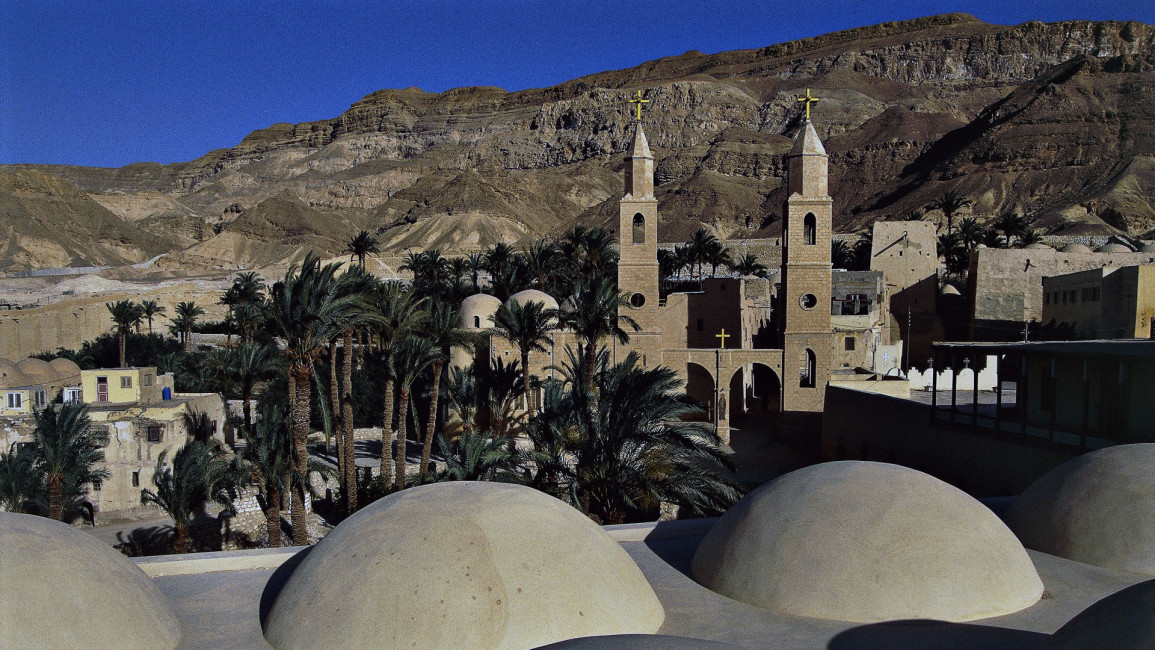Bishop murder saga rattles Egypt's Coptic community
A murky murder saga is gripping Egypt's Coptic Church and the fallout is rumbling through an ancient community already facing grave threats.
The Saint Macarius monastery lies in the dusty plains at Wadi el-Natrun, some 80 kilometres northwest of downtown Cairo.
It was there on the last Sunday in July, prosecutors say, that two monks known by their ecclesiastical names Isaiah and Philotheos lay in wait.
When 68-year-old Bishop Epiphanius passed by, the monks pounced. Isaiah struck the abbot on the head three times with a metal bar as Philotheos kept watch, the charges say.
The killing has rocked the close-knit Coptic clergy, shining a spotlight on a world often hidden from view.
It is also rattling through the faithful, the largest Christian community in the Middle East.
"This will have a huge impact. Coptic clergy are not just viewed as religious functionaries, but as fathers of the community," said Samuel Tadros from the Hudson Institute in Washington.
 |
Long-standing disagreements over religious dogma, the independence of monasteries and power struggles have all come under the microscope |  |
"The murder of a bishop, inside a monastery, (allegedly) at the hands of two monks, will send shock waves inside the community."
Motive mystery
Weeks after Epiphanius' body was found, the reasons for his death remain shrouded in mystery.
Prosecutors said on Sunday that Isaiah confessed to carrying out the murder due to "differences" - but no more details were given.
"What we know is very limited. The church and state agencies have not given away much," said Britain-based expert Shady Lewis.
"Personal grudge could be a very strong possibility."
Isaiah - whose real name is Wael al-Saad - had faced disciplinary proceedings before and was quickly defrocked after Epiphanius' body was found.
The Church has released little more information on the death, saying the investigation is in the hands of the authorities.
Twitter Post
|
"It is not to our advantage to cover up wrongdoings," said leader Pope Tawadros II in a statement, describing the incident as a "crime".
While the motive remains unclear, the killing and reactions to it have focused attention on schisms in the Church.
Long-standing disagreements over religious dogma, the independence of monasteries and power struggles have all come under the microscope.
Epiphanius backed teachings advocating less involvement in worldly affairs and upset some in the Coptic establishment by questioning the legacy of the former head of the Church.
But just as in any organisation it seems that feuds within the Church, including the one that might have killed him, can often be more basic.
"Most conflicts are localised, fluid and run around personal loyalties, power shares, financial issues, prestige," said Lewis.
"Dogma plays a role of course, but the main struggle is around centralising power within the Church, imposing hierarchal authority."
In the wake of the death, the Church leadership took wide-ranging steps.
It placed a one-year moratorium on accepting new monks, banned current ones from social media, tightened financial controls and refocused attention on spiritual life.
 |
For years the community, about 10 percent of Egypt's mainly Sunni Muslim population of 100 million, have coped with marginalisation and the ire of extremists |  |
Tawadros himself deleted his Facebook account, slamming the site as a "waste of time".
Gamal Asaad, a prominent Coptic thinker, said the death set off a warning bell for Church leaders that they have to reform and heal the rifts.
"During the funeral of the late Epiphanius, Pope Tawadros told the monks that they are monks in the monastery and not following any one person," he said.
Facing threats
For Copts in Egypt the furore around the death of Epiphanius is just the latest challenge they have faced.
For years the community, about 10 percent of Egypt's mainly Sunni Muslim population of 100 million, have coped with marginalisation and the ire of extremists.
Inter-religious clashes have strained relations between faiths and bloody bombings claimed by the Islamic State group have targeted Coptic worshippers.
Like other minority groups, the Coptic authorities have aligned closely with President Abdel Fattah al-Sisi, who led the ouster of Islamist leader Mohamed Morsi after protests against his rule.
While the murder may have dented the reputation of the clergy, few doubt the Church will maintain its central role for Copts.
For a community that sees itself under threat the Church provides the main identity and mediates relations with the state.
But beyond the latest scandal it appears many Copts still feel vulnerable.
Accountant Peter Fangary says he is hoping to leave Egypt one day - in part because of the greater pressures he feels as a Copt.
"Life is more difficult for Christians here," the 30-year-old told AFP, describing a general sense of prejudice he feels.
As for the murder of Bishop Epiphanius, he has heard of it of course, even if he rarely goes to church.
"I think Satan can lead anyone astray," he said of the case.
"I think Satan can make them kill."



